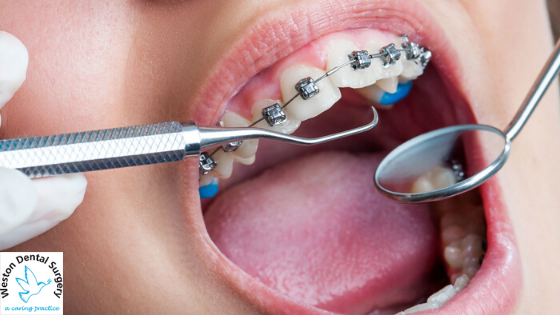 |
| What Are Braces And Things To Know Before Getting Them? |
White teeth are not only the key
to a beautiful appearance. It is also an element that gives self-confidence,
enhances self-esteem, promotes thorough chewing of food and supports proper
diction. But in some cases, people have to wear braces or special plates to
correct malocclusion and curvature of the teeth. Such imperfect, stained,
broken teeth can lead to social and emotional problems.
When it comes to aligning crooked
teeth, braces have always been the first choice for many. Braces adjust the
teeth to improve the appearance from an aesthetic point of view. This
orthodontic treatment is a good opportunity to obtain an attractive smile.
Wearing such orthodontic mouth guards will prevent any damage to your mouth.
Therefore, when considering the installation of braces on your teeth, keep in
mind that certain nutritional restrictions must be observed. For example, if
your child has crooked teeth, you can visit a children dentist in Canberra. This
write-up will describe every detail about braces and what necessary points you
must consider before wearing them.
Table of Contents
What Are Braces?
Braces are a complex
multi-component structure, which is fixed on the surface of the teeth and
gradually aligns their position. These braces are installed with the help of
orthodontic glue. In the classical design of the bracket system, there is
always a groove in which the orthodontic arch is installed. The pressure of
such an arc on the teeth leads to their gradual alignment. Braces are dental
systems aimed at eliminating malocclusion and alignment of the dentition.
How Do Braces Work?
The bracket system moves the
teeth due to the influence of the arc force created from a special material.
The required diameter and stiffness of the arc are chosen by the orthodontist.
In each case, it is determined individually. After this, the arc is placed in
the grooves of the brackets glued to each tooth of the jaw. The arc, which is
trying to return to its original form, constantly affects the tooth and
gradually moves it. The doctor fixes the braces on the teeth so that the force
of the arc moves the teeth in the right direction and corrects the bite. It
helps in bringing the teeth into a naturally true and beautiful position. As a
result, the jaw bone is remodeled and the teeth function correctly and look
aesthetically pleasing.
Things To Know Before Wearing The Braces?
● Choose The Right Doctor
People might be confused between
orthodontists and conventional dentists. In simple words, the orthodontist is
specially trained in tooth movement and jaw bone function. That is why they
know everything that an ordinary dentist does but their specialization is how
teeth move in the mouth. This makes them an ideal choice for installing and
controlling braces. Therefore, you need to bring along the appointment of an
orthodontist to fix the braces. An orthodontist is experienced in correcting
teeth using non-surgical procedures like braces. He/she is a specialist in the
diagnosis and treatment of malocclusion and crowded teeth. For example, an emergency
dentist in Canberra is experienced and specialists to offer better results.
● The Procedure Can Be Painful
An orthodontist often uses a
tongue-removing device when fixing dental braces. These devices are designed to
hold the tongue steady and prevent it from moving, while the orthodontist sets
up braces. A device, which is placed under the tongue, significantly reduces
the release of saliva, so you do not have to swallow and move the tongue. Although
such a device can help control the movement of the tongue, it can cause some
discomfort.
● Minor Toothache
Toothaches also often occur after
applying braces. Such aches are felt in the first few weeks, probably due to
the pressure exerted on the teeth. However, the pain will become significantly
more tolerable when you get used to wearing braces. In most cases, the pain
subsides significantly by the end of the first week. Frozen foods like ice
cream or gently sucking ice cubes can be helpful to drown out the pain. Rinsing
with warm salt water and taking over-the-counter painkillers like acetaminophen
can also help relieve pain.
● Food Will Get Stuck
Bites of any food you eat may get
stuck in your mouth. Foods get stuck in the crevices of braces and eventually
becomes a breeding ground for pathogenic microorganisms. This is one of the
most annoying things about wearing braces. The only way out is to chew food
thoroughly and properly brush your teeth after each meal. In addition, daily
flossing is very important to remove jammed food particles.
● Cost And Terms Of Treatment Differ
Installing dental braces can
sometimes not really be cheap. There may be expensive treatment options. But
since they are usually necessary, there are many dental plans and payment
schemes available to help patients cover their costs. It is important to know
that costs vary greatly. The actual cost of braces depends on the location,
clinic, age of the patient and the presence of other complicating problems.
Furthermore, the installation of metal braces will be cheaper, whereas the
installation of lingual braces is about two times more expensive. The ceramic
braces are similar to metal ones for the price.
● Braces Can Be Placed At Any Age
Dental braces are most often
associated with adolescents. There are no age limits for this kind of
corrective treatment. You can use braces to correct displaced teeth at any age
if your teeth and gums are strong enough. Dental braces are not suitable for
patients who have weak gums or poor teeth. Braces put a lot of extra pressure
on the gums. As a result, you will achieve tougher, stronger, and flexible gum
tissue.
● Fix The Bites
In addition to determining
whether your teeth are straight, your orthodontist will check if your bite is
healthy. A bite is what happens when you close two rows of teeth and then open
then again. When you do this, rows should meet but not be sanded or worn.
Similarly, there should not be large gaps along the line where two rows of
teeth meet. Problems with your bite can lead to headaches, chewing and speech
if left untreated. The orthodontists will quickly correct a minor dysfunction.
An undetected problem can turn into a serious problem.
Wrapping Up!
In order to make your braces
clean, you should brush your teeth and floss twice a day. Visit regular
checkups and tell your doctor about any unexpected changes in your teeth or
mouth. Ask questions and raise concerns regarding your procedure or treatment.
You should also keep your teeth and mouth as healthy as possible. Flossing will
require a little more time with accuracy. So, be careful, be gentle and do not
press too hard on your teeth.














